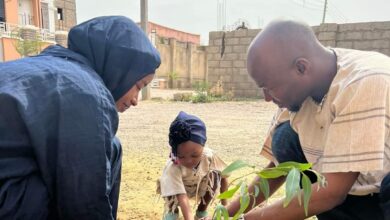Greenpeace Calls On Deutsche Bank To Halt Loan To Cameroon Plantation Company

The international environmental protection non-governmental organization, Greenpeace Africa has called on the German Deutsche Bank to “immediately annul a 25 million dollar loan” it has granted to Halcyon Agri based in Singapore, which has investments in rubber plantations in Cameroon and Malaysia.
“The detestable balance sheet of Halcyon Agri in the areas of human rights and the environment in violation of its own policy of durability largely disqualifies it from benefiting from financing. Deutsche Bank must cancel the loan to Halcyon Agri.
“The bank would do better by investing its millions directly in the communities where the enterprise destroys the means of subsistence and the tropical forest that it has ravaged,” declared Irene Wabiwa Betoko, the official responsible for the Greenpeace campaign within the Congo Basin forest.
According to Greenpeace Africa, Halcyon Agri, through its subsidiary in Cameroon Sud Cameroun Hevea (SUDCAM) has displaced communities of the local Baka people and destroyed over 10,000 hectares of virgin tropical forest on the periphery of the Dja forest and wildlife reserve which is inscribed as one of UNESCO’s world heritage.
“The company violates the most elementary norms of transparency and refuses to reveal the identities of its minority shareholders in SUDCAM,” Greenpeace added.
Halcyon Agri on its part holds that part of the Deutsche Bank loan would be used “to provide supplementary food security and augment the revenues of 13,000 small scale local agricultural operators”.
However, local communities that have been adversely affected by the operations of SUDCAM said they had never cared to respect even the most elementary clauses of its agreements with the national authorities.
“As noted by Greenpeace, SUDCAM has never revealed the names of its Cameroonian shareholders and this because they are the same people who are supposed to ensure that they respect the clauses contained in the agreement granting them concessions to create plantations in our forests. How do you expect the thief to catch himself?” declared local environmentalist Gregory Ebala.
This is not the first time Greenpeace has carried out a campaign against the granting of financing to the Singapore rubber giant. In 2018, the organization forced the Norway National Pension Fund to disinvest in Halcyon Agri because of the possible “risk that the enterprise could be responsible for grievous environmental damage due to the conversion of the tropical forest into rubber plantations in Cameroon”.
The Norway National Pension Fund found it “stupefying that the environmental impact study of SUDCAM did not mention that two species in the zone to be deforested were threatened and in danger of extinction”.
Support Our Journalism
There are millions of ordinary people affected by conflict in Africa whose stories are missing in the mainstream media. HumAngle is determined to tell those challenging and under-reported stories, hoping that the people impacted by these conflicts will find the safety and security they deserve.
To ensure that we continue to provide public service coverage, we have a small favour to ask you. We want you to be part of our journalistic endeavour by contributing a token to us.
Your donation will further promote a robust, free, and independent media.
Donate Here




